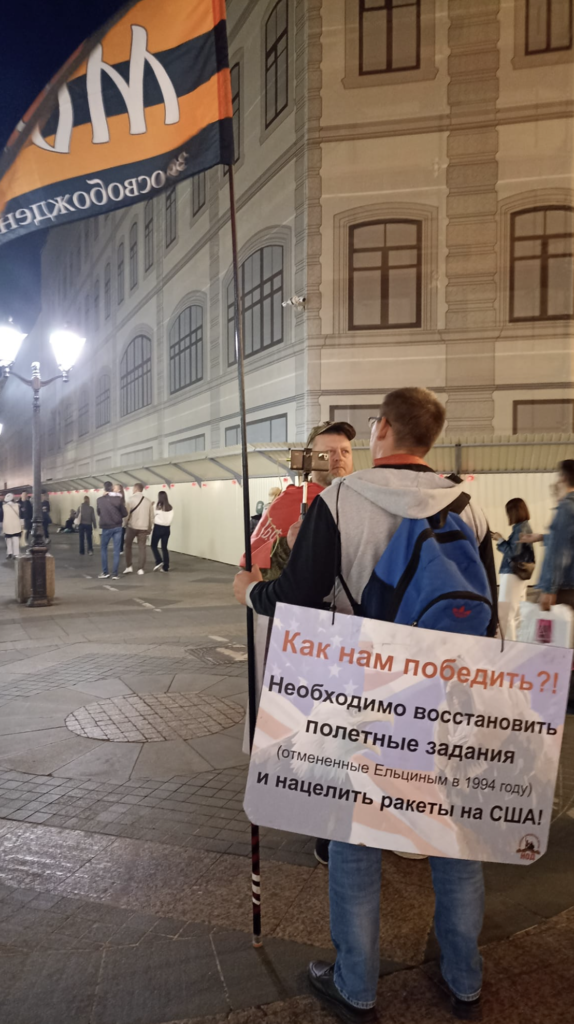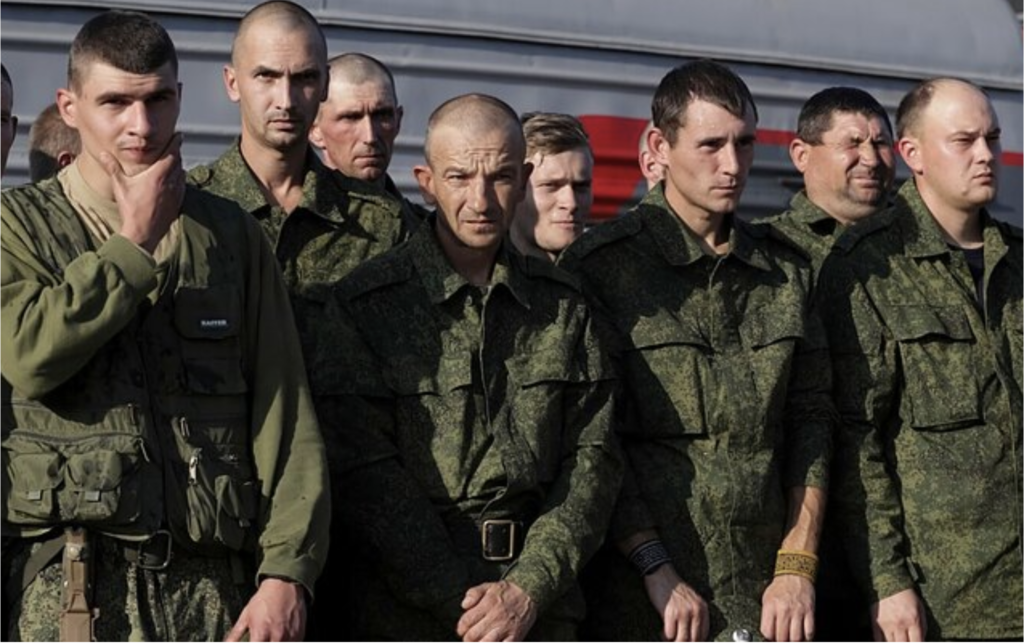The Public Sociology Laboratory, an independent research group of scholars and activists in St. Petersburg, stated in its report:
“Since the beginning of Russia’s so-called “special operation” in Ukraine, polling companies, both Kremlin-loyal and independent, have shown impressive numbers of Russians’ support for military action. But the polls only partly help us understand what Russians think about the war, and in some respect, they make it difficult to understand.
“First, the figures of support for the war from the polls have a very indirect connection with the real scale of this support. It is known that in authoritarian regimes, respondents tend to choose answers that emphasize their loyalty to the government; moreover, polling companies face a large number of refusals to answer questions. Second, even when polls show something (for example, that some Russians answer questions about support for a “special military operation” in the affirmative and others in the negative), this raises new questions. What exactly do the former support and what do the latter dislike? Moreover, only a minority of Russians have an unambiguous opinion about the ‘special operation,’ while the position of the majority of people cannot be described by simple formulas ‘for’ or ‘against.’ Their attitude to what is happening is contradictory and complex. Thus, quantitative methods are not enough for a deeper understanding of Russians’ perception of the war – more personal research is also required.”
We’ll try to present here both: latest pall, made by the biggest independent Russian company, and personal impressions of some people.
On August 24-30, 2023 the latest All-Russian survey was conducted by the non-governmental Levada Center. The survey was conducted at the respondent’s homes using the personal interview method.
38% of the respondents “definitely support” and 32% “rather support” the actions of the Russian armed forces in Ukraine. Only 9% of respondents “definitely don’t support” it.
The highest level of support for the actions of the Russian armed forces in Ukraine is characteristic of the oldest age group (55 years and older), where almost half of the respondents (47%) “definitely support” and 30% “rather support” the actions of the Russian armed forces in Ukraine.
The respondents from the youngest age group (18-24 years old) are least supportive – 57%. At the age of 25 to 39, 65% of respondents declare their support, and at the age of 40 to 54 – 67%. Among men, support for the actions of the Russian armed forces in Ukraine is slightly higher than among women – 75% vs. 65%. Strong support (answers “definitely supports”) is expressed less often in Moscow than in other settlements – this share is 10%-15% less than in other settlements.
Among supporters of the continuation of military operations, every third (32%) explains their opinion by the fact that “it is necessary to go to the end, one cannot stop halfway”, 16% by the fact that “‘Ukrainian fascism’ must be destroyed, not all Ukrainian nationalists have been destroyed yet”. The opinion that “not all goals have been achieved yet” and “negotiations will not lead to the desired result/ will not yield anything” is expressed by 13% of respondents.
Among supporters of peace negotiations half of respondents (52%) explain their position by the fact that “a lot of guys are already died”, “a lot of victims are on both sides”. Among the reasons for the transition to peace talks, 40% of respondents say that they are “tired of war”. Another 13% say that “it is necessary to be able to negotiate”, “negotiations are necessary”. Problems in the economy are mentioned by 6%, and another 5% say that the lack of military successes is the reason for the transition to peace talks.
The respondents name the exchange of prisoners of war (81%) and an immediate ceasefire between Russia and Ukraine (55%) as the preferred conditions for a peace agreement. According to respondents, Ukraine’s accession to NATO (75%), the return of the LNR and DNR to Ukraine (75%), and the return of the Zaporizhzhya and Kherson regions to Ukraine (68%) are unacceptable under any circumstances. Since February 2023, these perceptions have remained virtually unchanged.

Picket in the Moscow downtown. Poster: “What should we do to win? We need to restore the air force exercises canceled by Yeltsin and target the US with missiles.”
Here is how Russian independent website meduza.io answers the question “WHY ARE RUSSIANS GOING TO WAR?”:
“Russia is a country of poor, and for many of its residents, military service is one way to support themselves and their loved ones. Most soldiers fighting in Ukraine serve under contract: the authorities promise them a high salary (minimum 200,000 rubles a month [$2,000], compared to the Russian average of 65,000 rubles [$650]), a social package and benefits, as well as additional payments for participation in combat or severe injuries (three million in one lump sum [$30,000]). If a military man dies at the front, his relatives can count on ‘coffin money’. With the help of this money, many Russians are trying to pay off their debts – though it often takes a lot of effort to get the payments. But it’s not just about money.
“Many mobilized and contract soldiers believe propaganda and use its clichés to explain why they went to war. Such people say that Ukraine has been taken over by neo-Nazis and their masters Anglo-Saxons who want Russia to collapse. One might be surprised that anyone believes this, but the Russian propaganda machine is working at full force, it consistently reinforces imperialism in Russians. At the same time, many of those who go to the war do not immediately realize that the fighting in Ukraine is to the death. They believe that the Russian army is fighting with ‘precision weapons’ and see the fighting as a way to prove themselves.
“At the same time, many Russians do not have any clear political position in principle, they believe that ‘everything is not so unambiguous’. This is one of the options for safe behavior in modern Russia, where you can go to jail for anti-war slogans, but conscience does not allow you to support aggression. Of course, in future, political responsibility for the position ‘outside politics’ may grow. For now, however, people are driven by fear, and paradoxically, it is precisely because of this fear that they go to war. Some of those mobilized believe that ‘there are no fools sitting at the top,’ which means that the decisions made ‘up there’ are the only right ones. In addition, Russian men are experiencing a crisis of masculinity: many of them, for various reasons, do not have the opportunity to conform to the ideas of a ‘real man’ – a strong and wealthy master of the house, a defender of the family and homeland. Service in the army raises their self-esteem, helps them feel part of the male fraternity. Finally, to support the war, to participate in it, to help the military, in the view of the Russian authorities (and, as a consequence, of the public as well) means to ‘be like everyone else,’ to be a patriot. And anyone who does not agree with this is a traitor, and there is no mercy for him.”
Here is an example of a real dialog of Russians published by the known journalist Natalia Demina in FaceBook. The dialog, which well illustrates the Russian’s attitude to the war with Ukraine, is reprinted by many in Internet:
“I was traveling from Tula today. In my compartment sat a young girl in her 20s, a marketing expert; a sporty guy of about 30 and a tired woman of about 60, who said that she had lost her husband and put her house with an orchard up for sale because she had no strength to work there. The girl has a lot of relatives in Ukraine. The lady has a bunch of relatives in Germany. She was traveling to meet them in Kaliningrad.
“Suddenly the girl began to curse the “senile” American president.
I told her: ‘Whatever he is, he won in a fair and competitive election. And our Putin has never participated in such elections. And he wants to be one for life.
The girl reacted: ‘If Putin didn’t even want to participate in the elections, I’d put his name on the ballot!’
Me: ‘Well, it’s clear, you are Putin’s generation, it’s a misfortune, you’ve never seen an alternative. Power should be replaceable.
She: ‘If it weren’t for Putin, Russia wouldn’t spend so much money on defense.’
Me: ‘What good is that? Why not to spend on hospitals or roads?’
It turned out that both: the girl and the older lady were sure that the whole world is threatening us, 45+ countries around us are against us.
Me: ‘Why are they suddenly against us, if we used to live peacefully? What happened?’
We started talking about the war. The girl has a lot of relatives in Ukraine, but she thinks they are fools if they stayed there. And the girl and the lady said a lot of nasty things about Ukrainian refugees (how they are disliked in Germany, where they have come).
Me: ‘And if our missile falls on your cousin in Kiev, what will you say?
She: ‘Well, so it happened.’
Me: ‘And if a missile falls on you?’
She: ‘Well, everything can be. But the main thing is to protect our land!’
She pointing at the sporty guy: ‘And here he will protect us!’
It turned out that the guy traveling with us was a contract soldier, who recently returned from Ukraine and will go there again.
Me: ‘Why do you need this?”
He: ‘Ukrainians are “pindoses”, they are not human.
(“Pindos” is a Russian slang derogatory nickname for a citizen or inhabitant of the United States (“Pindostan”)
“The lady assured me that only Americans are fighting with Russians in Ukraine.
Me (to the guy): Can’t you find another job?
He: ‘I already found the real job and I like it.
Me: ‘Real job – to kill?’
The girl told about an acquaintance, who said that if her husband had not gone to war, she would have left him, she said he wouldn’t be a real man. The lady supported her, saying that if her husband were alive, he would have been among first who volunteered.
Me: ‘For what? Why kill Ukrainians? What is the purpose?’
They couldn’t explain, they said they had to.
Me: ‘And how come before we lived peacefully with Ukrainians, we were part of the same country, they were not ‘pindoses’ back then?
The guy didn’t know what to say.
The girl has relatives in France, but she has never been abroad. She’s been to Estonia and Lithuania. ‘But they hate us a lot, I won’t go there anymore.’
The girl assured me that she doesn’t watch TV, although their conversation is just a walking example of a typical TV program.”
Here are a couple of the Internet comments to this article of Natalia Demina:
“The fact that the author was not yet handed over to the FSS (former KGB) is a great luck.”
“She’s just now starting to realize that? It was clear to me even before Crimea. Ukrainians ask us why don’t you fight your government? That’s exactly why: Russians think they are fine, they’re happy with everything. They don’t want to be fought for. Because they know: there is no hope. I looked at the life of my grandmother, my mom: what did they see in this country? Nothing changes for centuries, there’s not a single generation that hasn’t gotten some kind of fucked up shit. Rare outbursts interspersed with decades of such gloom that you can’t even howl…”


